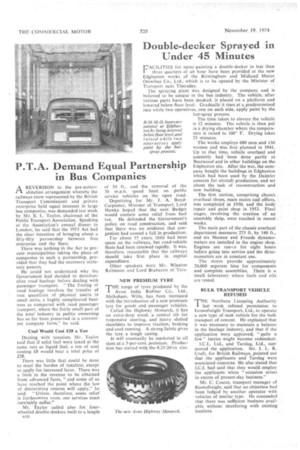P.T.A. Demand Equal Partnership in Bus Companies
Page 44

If you've noticed an error in this article please click here to report it so we can fix it.
A REVERSION to the pre-nation
alization arrangement whereby the railways (now represented by the British Transport Commission) and private enterprise held equal interests in large bus companies, was demanded last week by Mr. E. L. Taylor, chairman of the Public Transport Association. Speaking at the Association's annual dinner in London, he said that the 1953 Act had the clear intention of bringing about a fifty-fifty partnership between free enterprise and the State.
There was nothing in the Act to prevent municipalities taking the place of companies in such a partnership, provided that they had the necessary statutory powers.
He could not understand why the Government had decided to denationalize road haulage before dealing with passenger transport. "The freeing of road haulage involves the transfer of vast quantities of physical assets in small units, a highly complicated business as compared with road passenger transport, where the fairly small part of the total industry in public ownership has so far been preserved in a convenient company form," he said.
Coal Would Cost US a Ton Dealing with taxation, Mr. Taylor said that if solid fuel were taxed at the same rate as liquid fuel, a ton of coal costing would bear a total price of £28.
There was little that could be done to meet the burden of taxation, except to apply for increased fares. There was a limit to the revenue to be obtained from advanced fares, "and some of us have reached the point where the taw of diminishing returns will apply," he said. "Unless, therefore, some relief is forthcoming soon, our services must inevitably suffer."
Mr. Taylor called also for fourwheeled double-deckers built to a length i of 30 ft.. and the removal of the 30 mph. speed limit on public service vehicles on the open road.
Deputizing for Mr. J A. BoydCarpenter, Minister of Transport, Lord Hawke hoped that the next Budget would contain some relief from fuel tax. He defended the Government's policy on road construction, and said that there was no evidence that congestion had caused a fall in production.
For about 15 years, little had been spent on the railways, but road-vehicle fleets had been renewed rapidly. It was, therefore, reasonable that the railways should take first place in capital expenditure.
Other speakers were Mr. Winston Robinson and Lord Brabazon of Tara.
NEW PREMIUM TYRE
THE range of tyres produced by the Avon India Rubber Co., Ltd., Melksham, Wilts, has been increased with the introduction of a new premium Lyle for goods and passenger vehicles. Called the Highway Monarch, it has an extra-deep tread, a central rib for responsive steering, and heavy slotted shoulders to improve traction, braking and cool running. A strong fabric gives the tyre a tough casing.
It will eventually be marketed in all sizes at a 5-per-cent. premium. Production has started with the 8.25-20-in. size.




































































































